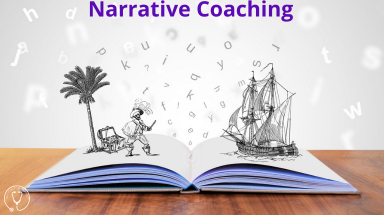What is Narrative Coaching?
Narrative Coaching is rooted in the idea that we all live our lives through stories. The stories that we tell ourselves will come out in the coaching if we allow them to.
At its core, its aim is to help people to reframe and retell their stories in a way that’s helpful for them and empowers them to make lasting change, which is what we’re all about in transformational coaching.
It’s not the operational coaching with a goal and an action plan and a deadline. It’s about understanding where someone is coming from, what the stories are that they’re telling themselves, what they’re telling other people. And how that is shaping their lives, thinking, and behaviours.
As coaches we both do this type of coaching without realising that we do it. And we train people to do this as well without calling it narrative coaching. One of the things that we do in the Tom’s Code framework, is that we get to explore the situation with the coachee, and then that’s a space for people to tell their story. And we don’t interrupt their story, we want to hear their story. Because there’s lots of rich information that can come out of that.
Some coaches and coach training may bypass their story and just want to get to how they change, how they move forward. But actually, there’s often something in the story that we can pull out and play with and explore.
What are the Origins of this Coaching Approach?
As with a lot of the approaches that we explore in coaching, they have their origins in therapy. Narrative therapy has been around for approximately 45 years, It started off with the work of Michael White and David Epstein, and their approach was based on the idea that people understand their lives and make sense of their experiences through their stories. And that those stories shape their view of the outside world.
David Drake, since the 2000s, has been the main advocate of this narrative approach to coaching. He suggests that through coaching, individuals can better understand the narrative they’re living by, and that they might choose to rewrite it so that they’re actually living more in alignment with their values and their purpose.
Listen To The Story
We are going give clients space to tell their story, and quite often it’s a story that they’ve told many times to themselves, and to other people. They’ve practiced it, rehearsed it, refined it, probably embellished it in certain places. They will have used a self-serving bias to tell their story so that they tell a story that serves them and serves their reputation. This means that they might over-dramatise it, often painting themselves in a particular light, perhaps of the victim light, if it serves them, because that gives them attention. or it might be a defender of justice, or it could be the hero. They are probably not going to present themselves as the villain, but they could be. The drama triangle that we have previously covered in our podcast and blog, is all about the drama, which is all about storytelling,
We’re going to treat that individual as the author of their story. It is their life, their story, and we work with them to explore their past experiences, their beliefs, their values, all those things that are going to shape the story they’re telling. And we’re going to think about how they could tell a better story. In some senses, sometimes the story they’re telling themselves isn’t helpful, so we’re going to try and help them to understand and create a deeper meaning from the story that they’re telling. And perhaps find some new perspective.
What are the Key Elements?
Rather than identifying a person as the problem, then narrative therapy really emphasises separating the person from the issue they’re facing, coaching the person, not the problem. It allows individuals to see their problems as external and therefore open to change.
There’s the story to explore, and then you will look at re-authoring the story. This is where we work to reframe, or rewrite, the story, particularly if it’s limiting or harmful
This approach certainly has some crossover with person-centered approach: Allowing people the time and space to talk, reframing, understanding new perspectives. We could weave in so many other approaches there.
In reframing and changing behaviours, there may be some useful crossover with, and assistance from cognitive behavioural coaching
It also has some echoes of transactional analysis, because that is about those scripts that are created from before the age of seven that we start to live by and we just keep playing out the same script. And in relationships we start to play out the same script, so the story becomes one that we’re familiar with and we keep returning to it and keep playing it out. Narrative coaching can help you to understand that story or script and then recreate a new one.
And the same applies to transactional analysis, that’s the whole point of TA; that we don’t have to keep retelling the same story, that we can create new stories.
Practically, How Can We Use This In The Coacing Room?
- Allow your coachees space to tell their story
- Notice the themes that come up in that narrative. The patterns of thinking, the emotional reactions and any behaviours that are showing up. Even if it’s a well-rehearsed story, in saying it out loud and being allowed to finish without someone jumping in, sometimes they can realise that they’re telling a story, and the flaws, and issues that come with it.
- Playback what you notice. Us playing back to them what we observe and hear, can allow them to recognise their story and how unhelpful it might be.
- Help your coachee to understand the emotions that come up, why it’s surfacing and then how it’s supporting the coachee, or how it’s not supporting the coachee.
- We’re then going to explore the story with our coachee with them. We might be looking at metaphors that come up, some thinking patterns, limiting beliefs, behaviours that we’re noticing. We’re going to deconstruct all of that, see what’s real, see what’s not real, see what’s helpful in that story.
- If we think about the Gestalt Approach, we might well use the empty chair exercise to explore the story from someone else’s perspective, and that could be a useful exercise.
-
And then we’re going to invite them to tell a different story. To re author the story is the phrase that would be used and perhaps tell a story that is more empowering and more helpful for them to move forward. It doesn’t mean we have to make stuff up. But if the story is not helpful, then creating a different story, and creating a different role for themselves can be really helpful and then integrating that story into the way that they start to behave and move forward.
If we provide that safe space for someone without them having to defend themselves, or us trying to fix it for them, or rushing them to a solution, allows the possibility of change for them. And that could be really empowering.
Quite often people are going to realise that they have a part to play in their story, that they’re an active agent in their story, that they have some responsibility for the story that’s unfolding and they actually then might start to take responsibility for what’s going on and for understanding how other players in the story might well be reacting in a way that they think is unhelpful. They can start to understand why it is happening.
It’s not a quick fix. You might get really lucky and someone might have a moment where they go, ‘oh yeah, well I’m just telling a story, I just need to be different, don’t I?’ And they go off and be different. But the chances are that those stories are so embedded and come from younger life experiences that it’s going to take some unravelling.
As with any of our transformational coaching approaches we are all about facilitating our coachee’s empowerment, their ability to change and recognising that their history is not their destiny and that they do have the ability to change the story and to tell and live in a different story.
In conclusion, the stories that we all tell ourselves are really powerful. They shape the way that we see the world and the way we navigate the world. So if we can allow our coaches to tell their story and to work with them on their story, then we’re going to do really good work in the coaching room.
Our transformational coaching methodologies can very much contribute to this approach, while underpinning it with psychological theory. You can find out more about our Transformational Coaching Diploma and the approaches we cover here.



